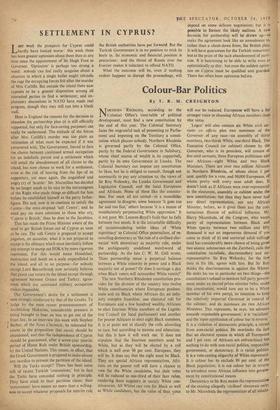SETTLEMENT IN CYPRUS?
T AST week the prospects for Cyprus could I./hardly have looked worse: this week there Here in England the reasons for the decision to abandon the partnership plan (it is still officially supported, but only for face-saving purposes) can easily be understood. The attitude of the forces after Mrs. Cutliffe's murder was too plain an intimation of what must be expected if it was persevered with. The Government, forced to face the choice between continued armed occupation for an indefinite period and a settlement which will entail the abandonment of all claims to the island, has now chosen to work for a settlement, even at the risk of hearing from the lips of its supporters, yet once again, the anguished and angry cry of 'Scuttle!' Mr. Macmillan has decided he no longer needs to be nice to the intransigents of the Right who made things so difficult for him before he established himself as the party father- figure. His task now is to continue to satisfy the Centre—the once-despised 'soft Centre'; and he need pay no more attention to those who cry, 'Cyprus is British,' than he does to the Jacobites.
This has made the Prime Minister aware of the need to get British forces out of Cyprus as soon as he can. The soft Centre is prepared to accept jingoism, on occasion; what it is not prepared to accept is the obloquy which must inevitably follow any attempt to stamp out EOKA by more rigorous repression. For this would mean bloodshed, destruction and death on a scale unparalleled in the island, and all to no purpose—for nobody except Lord Beaverbrook now seriously believes that peace can return to the island except through agreement between Greece and Turkey; agree- ment which our continued military, occupation makes impossible.
Our Government's desire for a settlement is now strongly reinforced by that of the Greeks, To judge by the most recent pronouncements of Archbishop Makarios, considerable pressure is being brought to bear on him to get out of the front line. In an interview this week with Stephen Barber, of the News Chronicle, he reiterated his assent to the proposition that enosis should be abandoned, and that the independence of Cyprus should be guaranteed, after a: seven-year interim period of Home Rule under British sponsorship, by the United Nations. This means, in effect, that the Greek Government is prepared to Make almost any sacrifice to prevent the partition of the island. Will the Turks accept? There has been some talk of recent Turkish 'concessions,' but in fact the Turks have conceded nothing in principle. They have stuck to their partition claim; their 'concessions' have meant no more than a willing- ness to accept whatever proposals for interim rule the British authorities have put forward. But the Turkish Government is in no position to stick its heels in. Its economic and financial position is precarious: and the threat of Russia over the frontier makes it 'reluctant to offend NATO.
What the outcome will be, even if nothing violent happens to disrupt the proceedings, will depend on some delicate negotiation; but it is possible to foresee the likely outlines. A new formula for partnership will be drawn up—to make the agreement look like an amendment to, rather than a climb-down from, the British plan. It will have guarantees for the Turkish minorities; but at the price of the tacit abandonment of parti- tion. It is heartening to be able to write even as optimistically as this : but even the mildest optim- ism on Cyprus must be qualified and guarded. There has often been optimism before.


































 Previous page
Previous page